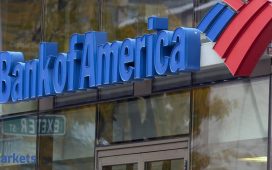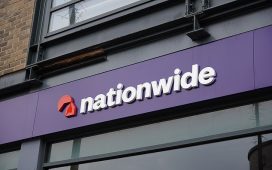Wyoming is moving toward becoming the first state to offer a state-backed cryptocurrency, according to Governor Mark Gordon.
Speaking at a conference in Jackson Hole on Thursday, Gordon revealed the state is working on its own stable token or stablecoin which it plans to launch next year.
According to Cowboy State Daily, he said: ‘We want to do it right. We want to find the right methodology to be able to implement it. We’ve done a lot of that work.’
In May, the state passed the Wyoming Stable Token Act that created a commission to study the issue and to provide stable tokens, which are typically tied to another asset like the dollar.
Wyoming is one of the first state in the country to explore having its own cryptocurrency, which Gordon says highlighted its commitment to innovation.

Speaking at a conference in Jackson Hole on Thursday, Governor Gordon, seen here, revealed the state is working on its own stable token or stablecoin which it plans to launch next year

In May, the state passed the Wyoming Stable Token Act that created a commission to study the issue and to provide stable tokens, which are typically tied to another asset like the dollar
He added: ‘For the state, it’s a wonderful way to help diversify our economy. It is exciting to see, as many trust companies have started to move here, financial firms that are looking at Wyoming, understanding we have the ability to be first movers fairly quickly and intelligently.
‘Innovation is in our DNA. That’s why Wyoming was the first to have the LLC law. (Digital) innovation has really been developed over several legislations, and it’s really remarkable where we are now.
‘I’m thrilled that we in Wyoming can continue to work hard to make sure this is a business friendly environment, that the taxes are low, and that we can push innovation.’
According to CNBC, the state is currently vetting potential partners to help build the stable token.
It will require an exchange and wallet providers, both Coinbase and Kraken offer both of these, to purchase and hold the token.
The state plans to issue the token to an exchange so they can then issue it to the retail user.
From there, it would be just another payment method for buying everyday things, according to Flavia Naves, the commissioner of the Stable Token Commission.
She told the outlet: ‘When you walk into Cowboy Coffee in Jackson, Wyoming, and you want to buy your latte, there’s going to be their wallet there in Solana that you can use to buy your coffee with the Wyoming token.’

The state plans to issue the token to an exchange so they can then issue it to the retail user
Naves also said that the commission plans to invest reserves that back each token in circulation and use the interest to make investments to public schools.
Despite the governor’s enthusiasm for the project, not everyone in the state is convinced that the tokens offer enough to go ahead with the risks.
Wyoming Banking Association President/CEO Scott W. Meier told Cowboy State Daily: ‘Right now, I just think we have a vast area of unknowns.
‘I wouldn’t say that your Wyoming community banks are necessarily opposed to it, but they’re not necessarily in support. They’re all just watching to see how this is impacting our industry.’
He is worried of how stable the token would actually work. Customers will come in to buy tokens, which the state would then buy in tokenized US treasury bills to back that token, as well as holding cash at the reserve.
Meier suggested the problem lies with what happens to the value of those bills when interest rates spike and someone wants to return their token for their cash back.

Despite the governor’s enthusiasm for the project, not everyone in the state is convinced that the tokens offer enough to go ahead with the risks

While there would be cash on hand, the state would need to then sell the treasury bills to make the transaction go through.
He added: ‘But, if you had a treasury bill that had 2% interest and all of a sudden interest rates go up, well you can’t sell that, because nobody’s going to want to buy it. Those are the things that the market will play funny about.’
Meier is also scared of taking cash out of the system that could create scarcity that could have ripple effects on the economy.
He added: ‘Let’s say a bank in Wyoming has a customer who wants to put $100,000 into a Wyoming stable token.’
‘That money is now out of our system. And maybe that’s good or maybe that’s bad, depending on how you look at it, but from a banking standpoint, that’s $100,000 that’s not in the bank. That’s $100,000 that the bank cannot lend.’
Already the decision to move ahead with the crypto has had its consequences, with Gordon listing stress tests and federal agencies placing obstructions on smaller banks.
He added: ‘The Fed now is more of a drag on innovation than it is an opportunity to put America first, to make sure that the dollar remains the standard that we all want to see.
‘But it’s also the CFPB, it’s the SEC, it’s the FDIC, which is interested in trying to debank the relationships between digital assets and banks, which is a core piece of what we’re trying to do here in Wyoming.’
In March of this year the price of Bitcoin reached an all-time high of $69,000 as people continue to plunge their savings into the currency.
The price of the currency surpassed its previous peak of $69,202 from November 2021 and made a huge resurgence following its crash in mid-2022 that saw its value drop by nearly two-thirds.
The record high was fueled by the US securities regulator approving 11 Bitcoin Exchange Trade Funds (ETFs) allowing it to be bought and sold like stocks.
While corporate investors and youngsters using smartphone apps have been able to invest in Bitcoin for years, the EFT approval opened the company up to a new goldmine of investors – namely those between the age 60 and 78.
It allowed for less tech-savvy boomers, born between 1946 and 1964, to have better access to buy and track the crypto. Instead of investing retirement funds in more traditional stock exchanges, pensioners have been buying up Bitcoin.
Some links in this article may be affiliate links. If you click on them we may earn a small commission. That helps us fund This Is Money, and keep it free to use. We do not write articles to promote products. We do not allow any commercial relationship to affect our editorial independence.










